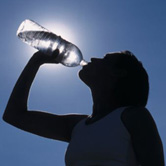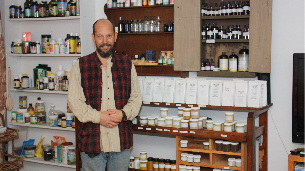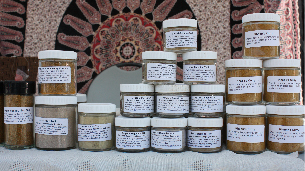Drink enough water - but not during a meal
 Water is essential for all life; a person will die within a few days without water. More than 70% of most life forms are water. Your muscles are 75% water, your blood is 82% water, your lungs are 90% water, your brain is 75% water and even your bones are 25% water.
Water is essential for all life; a person will die within a few days without water. More than 70% of most life forms are water. Your muscles are 75% water, your blood is 82% water, your lungs are 90% water, your brain is 75% water and even your bones are 25% water.
Water takes nutrients to the cells, lubricates joints, serves as a shock absorber in the eyes and spinal cord and works as a thermostat to help the body maintain a constant temperature. When we are too hot, the body sweats; when the sweat evaporates it lowers the body temperature. The amniotic fluid a baby floats in is mostly water and protects the baby when the mother moves about.
We lose water through breathing, sweating and body wastes; this alone should tell us we need to drink water every day. If the weather is hot, if you exercise heavily or work in a building all day with air-conditioning you will need additional water. The body does not store water like it stores calories! Sufficient water to flush out toxins when on a cleansing diet is essential to the process of detoxification. Click on this link to figure out how much H2O your body needs a day and when you need to take salt with it (too much water can unbalance your body's blood sodium levels.)
Tea and coffee should be avoided particularly during meals, as the more liquid taken the more difficult it is for proper digestion to take place.
Water and Thirst Facts:
- Thirst is not an adequate indicator of dehydration
- People confuse thirst with hunger
- People try to satisfy thirst with beverages that deplete the body of water
Health Problems Associated with Dehydration
- Energy Problems
- Fatigue
- Sugar Cravings
- Obesity
- Digestive Problems
- Heartburn
- Hiatal hernia
- Dyspepsia
- Poor Elimination
- Constipation
- Congestion
- Water retention
- Respiratory Problems
- Allergies
- Asthma
- Pain
- Joint pain
- Back pain
- Migraine headaches
- Nervous/Emotional
- Insomnia
- Depression
- Anxiety
- Irritability
- Difficulty concentrating
- Degenerative Diseases
- High blood pressure
- Diabetes
- Cancer
- And many others
Dehydration and Sugar Cravings
- The brain is the most hydrated organ of the body, being 85% water
- The brain and central nerves are bathed in a saline solution called cerebrospinal fluid
- The brain uses water to create energy
- When dehydrated the brain has to get more energy from food, which causes sugar cravings
Khabir's Hydration Therapy
- Drink 1-2 glasses of water upon arising with a tablespoon of Apple Cider Vinegar or lemon juice.
- Drink 1 eight ounce glasses of water ½ hour to 1 hour before meals
- Drink 1 glass 2-½ hours to 3 hours after meals
- Drink whenever your are thirsty, including with meals in small amounts (preferably hot ginger tea)
- Never drink ice water especially before meals
- Sip hot (previously boiled water) during the day as a tea or just plain hot water
- Don't drink distilled water or reverse osmosis water (due to excessive possessing and the lack of all minerals and life).
- Drink filtered (in your home if necessary) spring, ground or well water.
- Drink herbal teas instead of water As they are more nutritious, alkaline, hydrating (in most cases) and tastier then plain water.
Note: Totally clear urination might indicate over hydration. A slight yellow color of the urine is healthy.
See details of available services here













